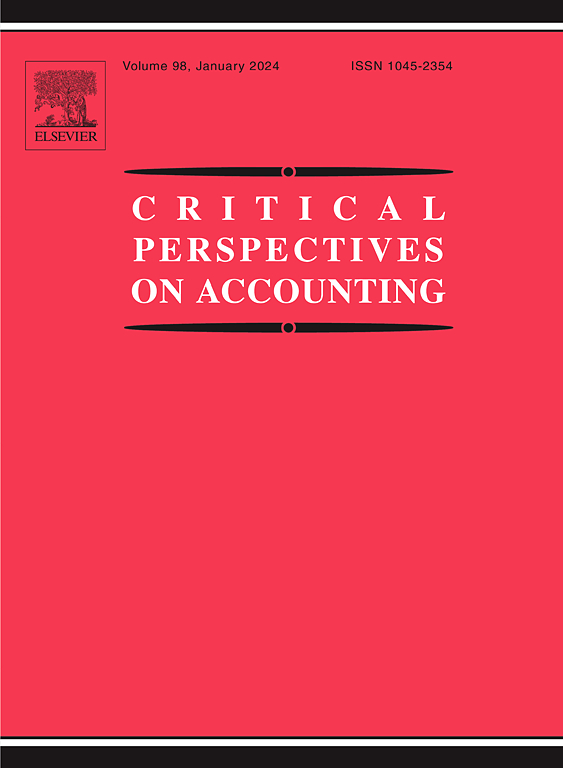关键对话会计和问责参与:通过参与式行动研究探索小额信贷和妇女赋权的微观政治
IF 5.7
2区 管理学
Q1 BUSINESS, FINANCE
引用次数: 0
摘要
先前的会计研究强调了主导发展机构思维和实践的新自由主义话语,包括其对 "赋权妇女 "的市场化表述。在 Tanima 等人(2020、2023、2024 年)的基础上,我们报告了一项批判性对话会计与问责(CDAA)活动,该活动采用参与式行动研究(PAR)方法,旨在为孟加拉国的一群贫困妇女创造空间,让她们讨论并集体反思自己对妇女赋权和小额信贷的看法。参与式行动研究方法被用来促进对小额信贷和妇女赋权的新自由主义方法的讨论,并探索与性别和发展(GAD)论述相关的其他可能性。我们说明了小组讨论和讲故事活动是如何在微观政治、不同话语和 "成为的政治"(Connolly,1995 年;Connolly,2011 年)思想的指导下,促进对父权制话语和新自由主义 "理性经济女性 "主体地位的讨论和辩论的。本文所报告的参与活动已经过去十年了,我们也在反思 CDAA 参与活动的独特性质,以及我们在这项研究中的早期经验和学习如何影响了我们在这一领域的持续研究。本文章由计算机程序翻译,如有差异,请以英文原文为准。
Critical dialogic accounting and accountability engagement: Exploring the micropolitics of microfinance and women’s empowerment through participatory action research
Prior accounting research highlights the neoliberal discourse that dominates development institutions’ thinking and practices, including its market-focused representations of what it means to be an “empowered woman”. Building on Tanima et al. (2020, 2023, 2024), we report on a critical dialogic accounting and accountability (CDAA) engagement, employing participatory action research (PAR) methods, aimed at establishing space for a group of poor women in Bangladesh to discuss and collectively reflect on their views about women’s empowerment and microfinance. PAR methods were used to promote discussion of neoliberal approaches to microfinance and women’s empowerment and explore alternative possibilities associated with gender and development (GAD) discourse. We illustrate how group discussions and storytelling activities informed by ideas of micropolitics, divergent discourses and a “politics of becoming” (Connolly, 1995, Connolly, 2011) promoted discussion and debate of patriarchal discourses and the neoliberal subject position of “rational economic woman”. Ten years on from the engagement reported here, we also reflect on the distinctive nature of CDAA engagement and how our early experiences in, and learnings from, this study have shaped our ongoing research in this area.
求助全文
通过发布文献求助,成功后即可免费获取论文全文。
去求助
来源期刊

Critical Perspectives on Accounting
BUSINESS, FINANCE-
CiteScore
9.40
自引率
7.80%
发文量
91
期刊介绍:
Critical Perspectives on Accounting aims to provide a forum for the growing number of accounting researchers and practitioners who realize that conventional theory and practice is ill-suited to the challenges of the modern environment, and that accounting practices and corporate behavior are inextricably connected with many allocative, distributive, social, and ecological problems of our era. From such concerns, a new literature is emerging that seeks to reformulate corporate, social, and political activity, and the theoretical and practical means by which we apprehend and affect that activity. Research Areas Include: • Studies involving the political economy of accounting, critical accounting, radical accounting, and accounting''s implication in the exercise of power • Financial accounting''s role in the processes of international capital formation, including its impact on stock market stability and international banking activities • Management accounting''s role in organizing the labor process • The relationship between accounting and the state in various social formations • Studies of accounting''s historical role, as a means of "remembering" the subject''s social and conflictual character • The role of accounting in establishing "real" democracy at work and other domains of life • Accounting''s adjudicative function in international exchanges, such as that of the Third World debt • Antagonisms between the social and private character of accounting, such as conflicts of interest in the audit process • The identification of new constituencies for radical and critical accounting information • Accounting''s involvement in gender and class conflicts in the workplace • The interplay between accounting, social conflict, industrialization, bureaucracy, and technocracy • Reappraisals of the role of accounting as a science and technology • Critical reviews of "useful" scientific knowledge about organizations
 求助内容:
求助内容: 应助结果提醒方式:
应助结果提醒方式:


